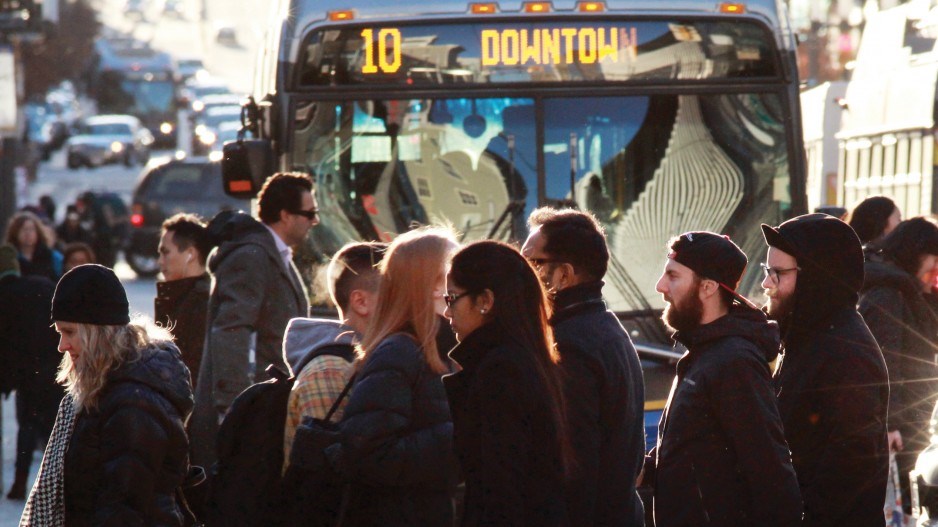TransLink’s ever-expanding “100 grand group” didn’t include two notable executives in 2015.
According to its Financial Information Act return, which was published a week late on July 8, TransLink paid 596 people $100,000 or more last year, up 14% from 2014 (524) and 37% from 2013 (434).
TransLink paid $221,929 to Doug Allen, who was interim CEO for six months, via his company, 1034 Tokyo Resources Inc. Mike Buda, the top staffer in the Mayors’ Council office, received $99,765, falling shy of the six-figure club.
“TransLink is becoming more and more top-heavy,” said Canadian Taxpayers’ Federation B.C. director Jordan Bateman. “Despite their claims these six-figure salaries are going to bus drivers and frontline workers, they’re really not, they’re lining the pockets of people at head offices, the administrators and managers on the system.”
Allen-hired consultants also exceeded six figures, but were also not counted because they were contractors. Ex-Provincial Health Services Agency CEO Lynda Cranston’s J.G. Cranston and Associates was paid $110,059. Cranston also became chairwoman of BC Rapid Transit Company (BCRTC), the SkyTrain subsidiary, and a director of West Coast Express. That meant another $8,358 for Cranston.
Allen’s Sage Group co-founder Catherine Holt was paid via Sage Group Projects (2014) Inc., which received $266,205.
“I am concerned with people who are doing jobs, high-profile people who aren’t listed in this document,” Bateman said. “I understand contractual situations, but it is a way for TransLink to bury high-paid staff.”
Sixty-six of the 148-member Transit Police made $100,000 or more. But, with a retroactive contract settlement, Bateman estimated that 124 will have graduated to the “100 grand group.”
Ian Jarvis, who was replaced as TransLink’s day-to-day CEO on February 11, 2015, was paid $463,463, including a $78,931 bonus. Trevor Jarvis Contracting Ltd., a landscaping company owned by the ex-CEO’s brother, received almost $777,500, mainly from BCRTC. The SkyTrain operating subsidiary had not previously proactively published its list of suppliers.
Trevor Jarvis Contracting was paid substantially more than what his contract called for. The day that Allen became CEO, internal documents show TransLink scrambled to provide information to assistant deputy minister of transportation, Jacquie Dawes, about Trevor Jarvis’ contract. The three-year, plus two option years, arrangement was supposed to pay $402,000 in 2015. Ian Jarvis had apparently disclosed the conflict of interest within TransLink and was not involved with the procurement.
TransLink put Vancouver Mayor Gregor Robertson’s annual pay over the $200,000 mark. Robertson received a $160,950 base as mayor, plus $34,600 as a TransLink director appointed by the Mayors’ Council and $10,265 as chairman of the Mayors’ Council. Two-thirds of Robertson’s TransLink pay was in the form of retainers; the other third resulted from fees for attending meetings.
Strategic Communications, the company behind Robertson’s three mayoralty victories, was paid $1,588,843 without competitive bidding to work on the Yes campaign in the failed plebiscite. Stratcom, which was on a preferred suppliers’ list, provided polling, robocalling and telephone town hall services.
BCRTC’s biggest expense was $111.6 million to InTransitBC, the SNC-Lavalin subsidiary that owns and operates the Canada Line on a long-term concession.
Bus operating subsidiary Coast Mountain Bus Company (CMBC) paid Chevron Canada more than $48 million. It also paid MVT Canadian Bus Inc. $38.3 million to operate the HandyDart door-to-door mini bus system for people with disabilities.
CMBC spent another $1.9 million on 14 taxi companies to augment HandyDart. Yellow Cab Co. Ltd. ($367,411), Bonny’s Taxi Ltd. ($296,814), and Black Top Cabs Ltd. ($285,639), Richmond Taxi Co. Ltd. ($192,434), North Shore Taxi (1966) Ltd. ($187,348) were the top five suppliers.
HandyDart riders have protested at TransLink board meetings over the company’s shift of work to taxi companies and the lack of training for taxi drivers to handle people with disabilities.
CMBC’s reliance on taxi companies increased after business for taxi companies dropped following the 2009 opening of the Canada Line, which provided a cheaper option between Vancouver International Airport and downtown Vancouver.
Under the province’s Financial Information Act, public organizations must complete and submit their returns no later than six months after their fiscal year end and make the reports available to the public. TransLink’s fiscal year ends December 31.
In 2015, TransLink did not release the report to Business in Vancouver until mid-September.




